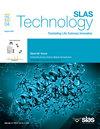基于生物启发的微流控肺炎克雷伯菌毒力因子和抗菌药耐药性分析
IF 3.7
4区 医学
Q3 BIOCHEMICAL RESEARCH METHODS
引用次数: 0
摘要
本研究旨在考察中国青岛地区肝脓肿肺炎克雷伯菌分离株的抗生素耐药性和微生物学特征。2022 年 4 月至 9 月期间,研究人员从三家三级医院的 120 名患者中采集了分离菌株。通过微流控技术实现了胶囊血清型(K1、K2)和毒力基因(rmpA、气杆菌素)的快速检测。使用 VITEK 2 Compact 系统对抗菌药敏感性进行了检测。研究结果表明,肺炎克氏菌中毒力极强的菌株出现频率很高,这往往与菌血症和较高的死亡率有关。这些菌株属于 K1 和 K2 血清型,主要携带 aerobactin 和 rmpA 基因。大多数分离菌株对抗生素敏感,但耐药菌株的出现强调了持续监控的必要性。这项工作证明了微流控平台在快速、精确地鉴定肺炎克氏菌方面的高效性,从而能够及时采取临床干预措施。本文章由计算机程序翻译,如有差异,请以英文原文为准。
Bio inspired microfluidic-based analysis of Klebsiella pneumoniae virulence factors and antimicrobial resistance
The objective of this research was to examine the antibiotic resistance and microbiological traits of Klebsiella pneumoniae isolates that were responsible for liver abscesses in Qingdao, China. Between April and September 2022, isolates were taken from 120 patients at three tertiary hospitals. Rapid detection of capsule serotypes (K1, K2) and virulence genes (rmpA, aerobactin) was achieved by using microfluidic-based techniques. Testing for antimicrobial susceptibility was done with the VITEK 2 Compact system. The findings showed that there was a high frequency of extremely virulent K. pneumoniae strains, which are often linked to bacteremia and higher death rates. These strains belonged to the K1 and K2 serotypes and were primarily carrying the aerobactin and rmpA genes. The majority of isolates were antibiotic-sensitive, but the emergence of resistant strains emphasizes the necessity of continuing surveillance. The efficiency of microfluidic platforms for the quick and precise characterization of K. pneumoniae is demonstrated in this work, enabling prompt clinical interventions.
求助全文
通过发布文献求助,成功后即可免费获取论文全文。
去求助
来源期刊

SLAS Technology
Computer Science-Computer Science Applications
CiteScore
6.30
自引率
7.40%
发文量
47
审稿时长
106 days
期刊介绍:
SLAS Technology emphasizes scientific and technical advances that enable and improve life sciences research and development; drug-delivery; diagnostics; biomedical and molecular imaging; and personalized and precision medicine. This includes high-throughput and other laboratory automation technologies; micro/nanotechnologies; analytical, separation and quantitative techniques; synthetic chemistry and biology; informatics (data analysis, statistics, bio, genomic and chemoinformatics); and more.
 求助内容:
求助内容: 应助结果提醒方式:
应助结果提醒方式:


